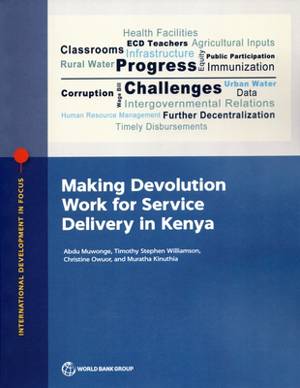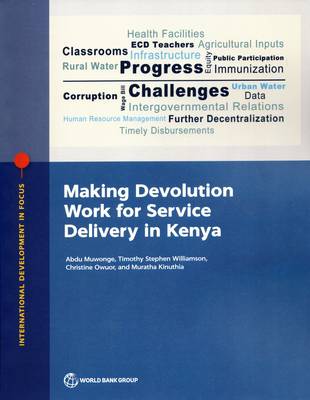
- Afhalen na 1 uur in een winkel met voorraad
- Gratis thuislevering in België vanaf € 30
- Ruim aanbod met 7 miljoen producten
- Afhalen na 1 uur in een winkel met voorraad
- Gratis thuislevering in België vanaf € 30
- Ruim aanbod met 7 miljoen producten
Zoeken
Making Devolution Work for Service Delivery in Kenya
Abdu Muwonge, Timothy Stephen Williamson, Christine Owuor
€ 69,95
+ 139 punten
Omschrijving
Kenya adopted a new constitution and began the process of devolution in 2010, ceding many formerly national responsibilities to new county governments. As an institutional response to longstanding grievances, this radical restructuring of the Kenyan state had three continuing main objectives: decentralizing political power, public sector functions, and public finances; ensuring a more equitable distribution of resources among regions; and promoting more accountable, participatory, and responsive government at all levels. The first elections under the new constitution were held in 2013 and led to the establishment of 47 new county governments. Each county government is made up of a county executive, headed by an elected governor, and an elected County Assembly that legislates and provides oversight. Making Devolution Work for Service Delivery in Kenya takes stock of how devolution has affected the delivery of basic services to Kenyan citizens nine years after the "devolution train" left the station. Whereas devolution was driven by political reform, the ensuing institutions and systems were expected to deliver greater socioeconomic equity through devolved service delivery. Jointly coordinated by the government of Kenya and the World Bank, the Making Devolution Work for Service Delivery (MDWSD) study is the first major assessment of Kenya's devolution reform. The study provides key messages about what is working, what is not working, and what could work better to enhance service delivery based on currently available data. It provides an independent assessment of service delivery performance in five sectors: agriculture, education, health, urban services, and water services. This assessment includes an in-depth review of the main pillars of devolved service delivery: accountability, human resource management, intergovernmental finance, politics, and public financial management. In addition to its findings for the present, the MDWSD study provides recommendations on how Kenya can improve its performance in each of these pivotal areas in the future.
Specificaties
Betrokkenen
- Auteur(s):
- Uitgeverij:
Inhoud
- Aantal bladzijden:
- 194
- Taal:
- Engels
- Reeks:
Eigenschappen
- Productcode (EAN):
- 9781464817267
- Verschijningsdatum:
- 14/04/2022
- Uitvoering:
- Paperback
- Formaat:
- Trade paperback (VS)
- Afmetingen:
- 216 mm x 279 mm
- Gewicht:
- 635 g

Alleen bij Standaard Boekhandel
+ 139 punten op je klantenkaart van Standaard Boekhandel
Beoordelingen
We publiceren alleen reviews die voldoen aan de voorwaarden voor reviews. Bekijk onze voorwaarden voor reviews.







